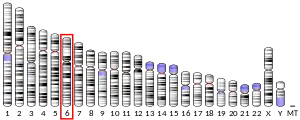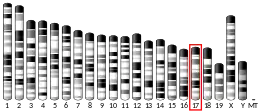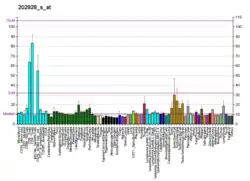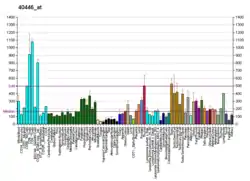PHF1
PHD finger protein 1 is a protein that in humans is encoded by the PHF1 gene.[5][6][7]
Function
This gene encodes a protein with significant sequence similarity to Drosophila Polycomblike. The encoded protein contains a zinc finger-like PHD (plant homeodomain) finger which is distinct from other classes of zinc finger motifs and which shows the typical Cys4-His-Cys3 arrangement. PHD finger genes are thought to belong to a diverse group of transcriptional regulators possibly affecting eukaryotic gene expression by influencing chromatin structure. Two transcript variants have been found for this gene.[7]
References
- ENSG00000225553, ENSG00000239756 GRCh38: Ensembl release 89: ENSG00000112511, ENSG00000225553, ENSG00000239756 - Ensembl, May 2017
- GRCm38: Ensembl release 89: ENSMUSG00000024193 - Ensembl, May 2017
- "Human PubMed Reference:". National Center for Biotechnology Information, U.S. National Library of Medicine.
- "Mouse PubMed Reference:". National Center for Biotechnology Information, U.S. National Library of Medicine.
- Coulson M, Robert S, Eyre HJ, Saint R (March 1998). "The identification and localization of a human gene with sequence similarity to Polycomblike of Drosophila melanogaster". Genomics. 48 (3): 381–3. doi:10.1006/geno.1997.5201. PMID 9545646.
- Hong Z, Jiang J, Lan L, Nakajima S, Kanno S, Koseki H, Yasui A (May 2008). "A polycomb group protein, PHF1, is involved in the response to DNA double-strand breaks in human cell". Nucleic Acids Research. 36 (9): 2939–47. doi:10.1093/nar/gkn146. PMC 2396414. PMID 18385154.
- "Entrez Gene: PHF1 PHD finger protein 1".
Further reading
- Cao R, Wang H, He J, Erdjument-Bromage H, Tempst P, Zhang Y (March 2008). "Role of hPHF1 in H3K27 methylation and Hox gene silencing". Molecular and Cellular Biology. 28 (5): 1862–72. doi:10.1128/MCB.01589-07. PMC 2258785. PMID 18086877.
- O'Connell S, Wang L, Robert S, Jones CA, Saint R, Jones RS (November 2001). "Polycomblike PHD fingers mediate conserved interaction with enhancer of zeste protein". The Journal of Biological Chemistry. 276 (46): 43065–73. doi:10.1074/jbc.M104294200. PMID 11571280.
- Suzuki Y, Yoshitomo-Nakagawa K, Maruyama K, Suyama A, Sugano S (October 1997). "Construction and characterization of a full length-enriched and a 5'-end-enriched cDNA library". Gene. 200 (1–2): 149–56. doi:10.1016/S0378-1119(97)00411-3. PMID 9373149.
- Maruyama K, Sugano S (January 1994). "Oligo-capping: a simple method to replace the cap structure of eukaryotic mRNAs with oligoribonucleotides". Gene. 138 (1–2): 171–4. doi:10.1016/0378-1119(94)90802-8. PMID 8125298.
External links
- PHF1+protein,+human at the US National Library of Medicine Medical Subject Headings (MeSH)
This article incorporates text from the United States National Library of Medicine, which is in the public domain.
This article is issued from Wikipedia. The text is licensed under Creative Commons - Attribution - Sharealike. Additional terms may apply for the media files.





